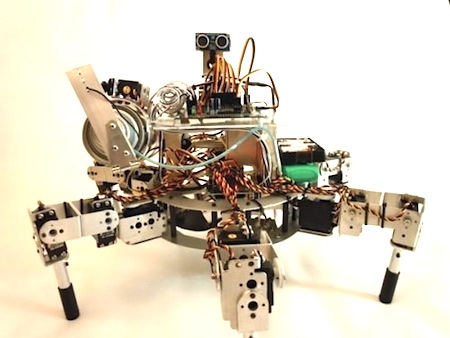Science Fiction
Dictionary
A B C D E F G H I J K L M N O P Q R S T U V W X Y Z
Prospero, Robotic Farmer

Prospero is a robotic farmer prototype presented by vanmunch in response to a robot challenge at Schmart Board.
As you can see in the picture below, Prospero is a hexapod robot; the intent is to take agricultural machinery (and agbots) in a different direction. Rather than use huge machines and crops measured by thousands of acres, why not try using smart robots to do farming on a plant-by-plant basis?

(Prospero, Robotic Farmer)
Prospero is an autonomous hexapod that can instantly change directions without turning its body, avoid objects, detect seeds (that it or another robot has planted), plant seeds at a specified spacing, mark/apply a pre-emergent herbicide &/or fertilizer and let other Prospero robots in the area know if it needs help planting seeds in its area or if the area has been planted. It's meant to be deployed as part of a larger group/ swarm and its behavior uses swarm and game theory......what if we were able to make farming decisions on a foot by foot or plant by plant basis? This would dramatically increase the productivity of the land, but you would also dramatically increase the number of people and the cost of business. This is a problem if you used people, but what about a swarm of simple, inexpensive robots?
(Prospero, Robotic Farmer video)
Philip K. Dick has a fairly early reference for the idea of farm robots in his 1955 story War Veteran; he mentions a robot gardener.
Update Feb-28-2015: I found an earlier and more complete reference; see the article for robot farmer from The Turning Wheel by Philip K. Dick (19540. End update.
Scroll down for more stories in the same category. (Story submitted 3/18/2011)
Follow this kind of news @Technovelgy.| Email | RSS | Blog It | Stumble | del.icio.us | Digg | Reddit |
Would
you like to contribute a story tip?
It's easy:
Get the URL of the story, and the related sf author, and add
it here.
Comment/Join discussion ( 0 )
Related News Stories - (" Agriculture ")
MK-V Smart Tractor - Fully Electric, Farmer Optional
'A small electric tractor was working at the far side, and a slight hum could be heard from where he sat.' - Warner Van Lorne, 1936
Vertical Farm In Singapore's Output Is 1.5 Tons Per Day
'A towering eighty-story structure like the office "In-and-Out" baskets stacked up to the sky.' - Pohl and Kornbluth, 1952.
Mashambas Skyscraper Farm Design Wins
'...a towering eighty-story structure like the office In-and Out baskets stacked up to the sky.' - Poh and Kornbluth, 1952.
Self-Driving Tractors From China Plan Ahead
'Machines that seemingly with full consciousness walked out into the fields to do their daily work.' - Otfrid von Hanstein
Technovelgy (that's tech-novel-gee!) is devoted to the creative science inventions and ideas of sf authors. Look for the Invention Category that interests you, the Glossary, the Invention Timeline, or see what's New.
Science Fiction
Timeline
1600-1899
1900-1939
1940's 1950's
1960's 1970's
1980's 1990's
2000's 2010's
Current News
The New Habitable Zones Include Asimov's Ribbon Worlds
'...there's a narrow belt where the climate is moderate.'
Can One Robot Do Many Tasks?
'... with the Master-operator all you have to do is push one! A remarkable achievement!'
Atlas Robot Makes Uncomfortable Movements
'Not like me. A T-1000, advanced prototype. A mimetic poly-alloy. Liquid metal.'
Boring Company Drills Asimov's Single Vehicle Tunnels
'It was riddled with holes that were the mouths of tunnels.'
Humanoid Robots Tickle The Ivories
'The massive feet working the pedals, arms and hands flashing and glinting...'
A Remarkable Coincidence
'There is a philosophical problem of some difficulty here...'
Cortex 1 - Today A Warehouse, Tomorrow A Calculator Planet
'There were cubic miles of it, and it glistened like a silvery Christmas tree...'
Perching Ambush Drones
'On the chest of drawers something was perched.'
Leader-Follower Autonomous Vehicle Technology
'Jason had been guiding the caravan of cars as usual...'
Golf Ball Test Robot Wears Them Out
"The robot solemnly hit a ball against the wall, picked it up and teed it, hit it again, over and again...'
Boring Company Vegas Loop Like Asimov Said
'There was a wall ahead... It was riddled with holes that were the mouths of tunnels.'
Rigid Metallic Clothing From Science Fiction To You
'...support the interior human structure against Jupiterís pull.'
Is The Seattle Ultrasonics C-200 A Heinlein Vibroblade?
'It ain't a vibroblade. It's steel. Messy.'
Roborock Saros Z70 Is A Robot Vacuum With An Arm
'Anything larger than a BB shot it picked up and placed in a tray...'
A Beautiful Visualization Of Compact Food
'The German chemists have discovered how to supply the needed elements in compact, undiluted form...'
Bone-Building Drug Evenity Approved
'Compounds devised by the biochemists for the rapid building of bone...'
